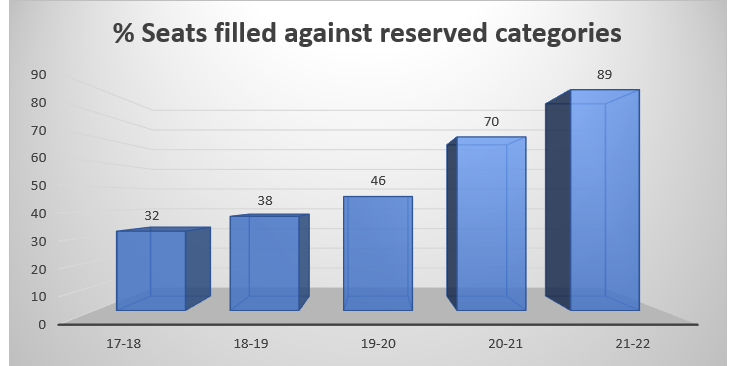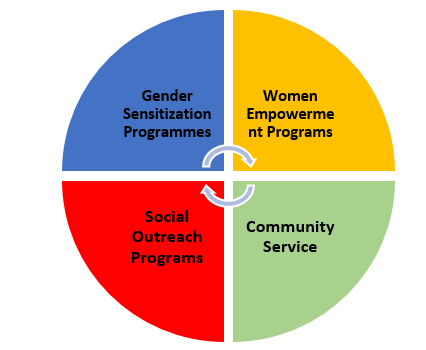INSTITUTIONAL DISTINCTIVENESS
“Breaking Barriers and Building Bridges: D. S. Govt. College for Women’s Journey towards
Empowering Women with a Social Conscience”
Introduction:
Access to higher education remains a significant challenge for women around the world. Women face multiple barriers in accessing higher education. These barriers include poverty, social and cultural norms, and a lack of access to quality education. The college is “Breaking Barriers and Building Bridges” by addressing these issues by providing opportunities for underprivileged rural women to access education.
Increased Admissions
One of the most notable achievements of this college has been the significant increase in admissions over the past few years. This can be attributed to a variety of factors, including increased outreach efforts, streamlined application processes, and expanded academic offerings. Specifically, the college has made a concerted effort to reach out to traditionally underserved communities, including rural areas and low-income families, and to provide targeted support to help students navigate the application process.

There is steady increase in admissions over the past five years. In the first year of, there were 109 admissions, while in the fifth year, there were 180 admissions. This represents a 96% increase in admissions over the course of the program.
Increased Admissions from reserved categories:
The college’s efforts to increase access to higher education have resulted in a significant increase in the percentage of admissions from reserved categories. The college’s outreach programs have encouraged more women from reserved categories to consider higher education, and the simplified application process with the help of college has made it easier for these women to apply and enroll.

In terms of the demographic breakdown of the students over the past five years, there is a steady increase in admissions of students from reserved categories, such as SCs and OBCs.
Scholarships

Pass Percentage
One of the primary ways that the college is working to bridge the gap to higher education is through the provision of quality teaching and mentoring. The college has a team of experienced faculty members who are committed to providing students with an excellent academic experience. The faculty members use various teaching methods such as interactive lectures, case studies, and group discussions to enhance students’ learning experiences. The college also has a comprehensive mentoring program that provides individualized support to students, helping them to stay motivated and focused throughout their academic journey.

During the last five years there is a significant increase in academic performance among students. In the first year of the program, the pass percentage was 60%, while in the fifth year, it had increased to 90%. This represents a 50% increase in pass percentage.
Journey towards Empowering Women with a Social Conscience:
Women empowerment is an essential aspect of social development. Empowering women with a social conscience involves creating awareness among women about their rights, responsibilities, and potential for becoming agents of change in society. The college has been working towards empowering women with a social conscience through various initiatives. These initiatives include:

Gender Sensitization Programs:
The college conducts gender sensitization activities to create awareness among students about gender issues and to promote gender equality. The programs aimed to encourage students and staff to respect diversity and promote gender equality.
Activities such as Woman Equality Day, Woman teachers day, International Women’s Day, National girl Child Day and Awareness programs on DISHA, , Invited talks on Women empowerment, Campaigns against social evils such as early child marriages and other programs have emphasized the need for women to be financially independent, politically active, and socially responsible.
Women Empowerment Programs:
The college organizes various programs aimed at empowering women, including skill-building workshops, leadership training programs, and entrepreneurship development programs.
Skill development and Entrepreneurship training programs such as Disaster management training, Preparation of mixed fruit jam, Tailoring classes, preparation of candle making, stencil painting, Preparation of thread bangles and ear rings, paper flowers, wall hangings, bottle craft etc. provide women with training and skills in areas such as entrepreneurship, leadership, financial management, and vocational skills. This can help women to become more economically independent and contribute to their families and communities.
Social Outreach Programs:
The college encourages students to participate in social outreach programs to help them understand the challenges faced by marginalized communities and to develop a sense of social responsibility.?
These programs include
health awareness programs such as AIDS day rally, Swatch Pakwada, Blood Donation Day, Health India Fit India, 3K Run, Blood donation camp etc.
Disaster relief programs such as Distribution of Masks and sanitizers Environmental programs such as Crop rotation campaign
Social justice programs like Door to door survey on the status of women education social outreach programs are important for addressing social issues and promoting community development. These programs can provide support and assistance to individuals and communities who face challenges and barriers. By promoting social outreach programs, we can create a more just and equitable society where everyone has the opportunity to thrive.
Community Service:
The college encourages students to engage in community service activities, such as volunteering at orphanages, old age homes, and schools for underprivileged children.
Volunteering programs: Collection and distribution of old cloths at orphanages and old age homes, Swatch Bharath program by NSS volunteers,
Donation drives: Distributing sarees to old age people, groceries and fruits at old age home, fruits and biscuits at orphanage, D etc. The college’s efforts towards empowering women with a social conscience have had a significant impact. The college has seen an increase in the number of students who are aware of gender issues and who are committed to promoting gender equality. Additionally, the college has seen an increase in the number of students who are engaged in community service activities, indicating a growing sense of social responsibility among students.
Conclusion:
The D.S. Govt. College for Women has been successful in its journey towards empowering women with a social conscience. The college’s efforts have helped students become aware of gender issues, develop leadership skills, and engage in community service activities. As the college continues to strive towards its goal of empowering women, it will continue to make a positive impact on the lives of women in India.
